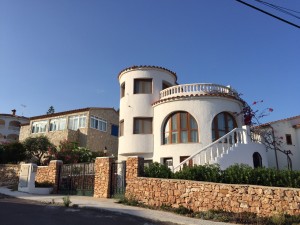Spain continues to be one of the most popular countries for Britons looking to buy property abroad and many people think now is an excellent time to take advantage of low property prices and buy a holiday home in one of the sunniest countries in Europe (visit www.aplaceinthesun.com/spain to see some of the properties on offer).
 If you decide to go ahead and buy a holiday home, it may not always be practical or even possible to be in Spain to sign contracts or apply for any necessary documentation in person. This is why you might wish to sign a power of attorney, or escritura de poder (poder for short), which allows you to appoint someone to act on your behalf.
If you decide to go ahead and buy a holiday home, it may not always be practical or even possible to be in Spain to sign contracts or apply for any necessary documentation in person. This is why you might wish to sign a power of attorney, or escritura de poder (poder for short), which allows you to appoint someone to act on your behalf.
This blog post should hopefully answer some of the questions that you may have about granting a power of attorney for Spain.
Who can be my attorney(s)?
Typically your attorneys will be lawyers in Spain who are assisting you with the transaction, but they could also be family members or friends who are in Spain and who can act on your behalf. You are free to choose who you would like to represent you.
What should a power of attorney for Spain include?
A power of attorney for Spain would usually include the following details:
- Your details (as the grantor or poderdante), as well as the details of the attorney(s) that you wish to appoint.
- The powers (facultades) that you are going to grant.
The powers can relate to a specific procedure or property, or they can be more general. Attorneys are usually not able to do anything on your behalf that is not explicitly included in the power of attorney but at the same time it may not be wise or appropriate to grant powers that are too wide, so it is important to consider the scope of the powers carefully.
Some commonly granted powers are: executing and signing documents, making payments, appearing before public authorities, contracting insurance or utilities, operating bank accounts, obtaining copies of the power of attorney, and obtaining an N.I.E. number.
- The details of the notary who witnessed you signing the power of attorney in the UK.
To ensure it is fully effective in Spain, a power of attorney for use in Spain needs to be signed in the presence of a notary, who also adds his/her signature and notarial seal.
- An apostille (or apostilla), issued by the Foreign and Commonwealth Office.
This confirms the authenticity of the notary’s signature and seal, so that the document can be used in Spain (since both the UK and Spain are parties to Hague Convention, the old procedure of consular legalisation was replaced by the apostille issued by the FCO). The process of obtaining an apostille is also called ‘legalisation’ and your notary will normally be able to organise this for you. You can visit the Foreign Office website for more information: https://www.gov.uk/get-document-legalised.
Should the power of attorney be in English or in Spanish?
Since the power of attorney will be used in Spain, a Spanish version will be required at some point. If you do not speak Spanish, it is a good idea to ask your lawyer or notary to draft an English and Spanish bilingual version of the document for you to sign, which ensures that you understand the document that you are signing and that it can be used in Spain without having to obtain a sworn translation at a later stage. We can help you translate your power of attorney into Spanish.
If you do speak Spanish to a sufficient level, and your notary does as well, then there may not be a need for an English version of the document and you could use the Spanish-only version that your lawyers in Spain may have prepared.
What is an N.I.E. number?
N.I.E. stands for Número de Identidad de Extranjero or Foreign Nationals’ Identity Number and you will need it for many different transactions in Spain, such as opening a Spanish bank account, buying or selling property, and inheriting assets. It is in many respects equivalent to the D.N.I. for Spanish citizens (Documento Nacional de Identidad or Spanish Identity Number).
Do powers of attorney ‘expire’?
In normal circumstances, your power of attorney will not expire at a particular time unless you include a clause that specifically states when you would like it to end. If you do not include this clause but decide in the future that you would like to change the powers or revoke the power of attorney entirely, you should contact a lawyer or notary and they will be able to help you with this.
There are certain events that will automatically revoke a power of attorney, including the death or the loss of mental capacity of the grantor of the power.
If you want to save yourself from having to travel back and forth to Spain, you can consider granting a power of attorney. In many cases, it may save you both time and money. Your notary should be able to guide you through the various steps of the process.